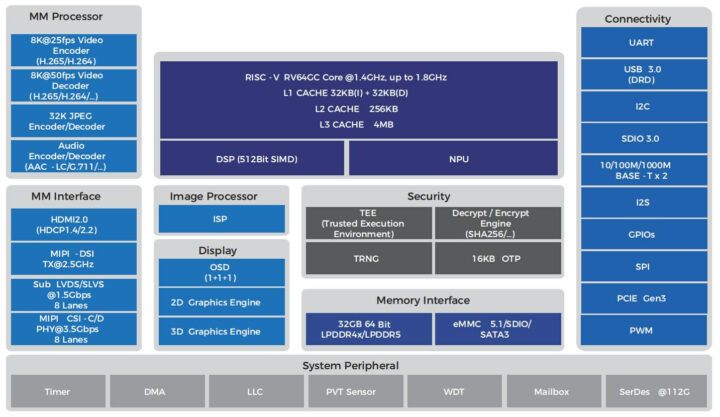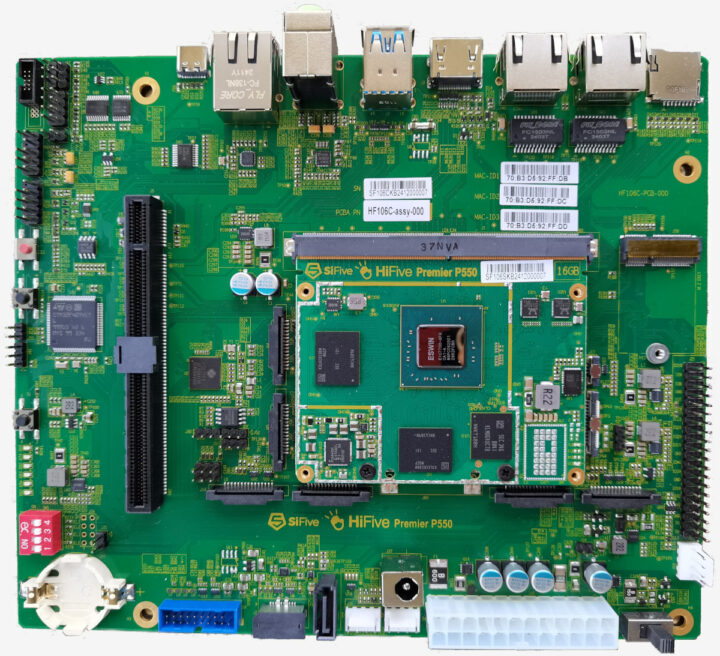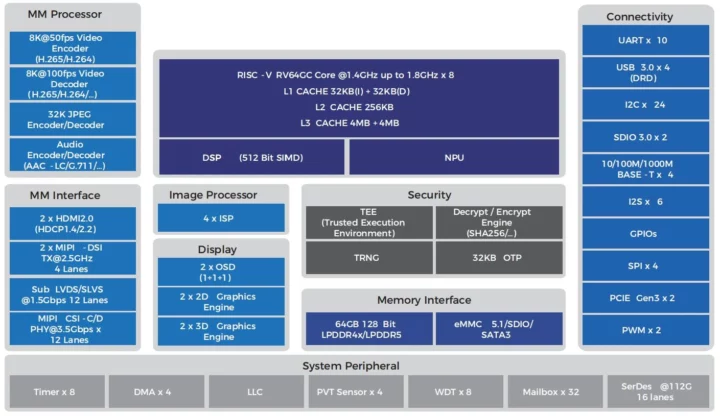Yesterday we noted Sipeed was working on the LM5A system-on-module powered by ESWIN EIC7700X quad-core RISC-V processor with a ~20 TOPS AI accelerator in order to integrate it into its Lichee Book laptop and other carrier boards. So today, I’ve decided to look into the EIC7700X SoC designed by “BEIJING ESWIN COMPUTING TECHNOLOGY CO., LTD”, or ESWIN for shorts.
The EIC770X features four 64-bit RISC-V (RV64GC) cores clocked up to 1.8 GHz, an Imagination AXM-8-256 3D GPU, a 19.95 TOPS NPU, H.265/H.264 video encoder/decoder capable of handling up to 32x 1080p30 videos, various video output (HDMI + DSI) and input interfaces, dual GbE, 4-lane PCIe Gen 3, and more.

ESWIN EIC7700X specifications:
- CPU
- 4x SiFive Performance P550 RV64GC RISC-V cores @ 1.4GHz (up to 1.8GHz) with Cortex-A75-class performance
- 32KB(I) + 32KB(D) L1 Cache
- 256KB L2 Cache
- 4MB shared L3 Cache
- Cache supports ECC (support SECDED)
- DNN Accelerator – 19.95 TOPS (INT8)
- Vision DSP – DSPs single cluster; support 512 INT8 SIMD
- Multimedia Decoder/Encoder
- HEVC (H.265) and AVC (H.264) supported
- H.265 up to 8K @ 50fps or 32 channels of 1080p30 video decoding
- H.265 up to 8K @ 25fps or 13 channels of 1080p30 video encoding
- JPEG ISO/IEC 10918-1, ITU-T T.81, up to 32K x 32K
- Vision Engine
- HAE (2D Blit, Crop, Resize, Normalization)
- Imagination AXM-8-256 3D GPU with support for OpenGL ES 3.2, EGL 1.4, OpenCL 1.2/2.1 EP2, Vulkan 1.2, Android NN HAL
- OSD (3 layers)
- Audio Codec
- AAC-LC encoding
- G.711/G.722.1/G.726/MP2L2/PCM/MP3/AAC-LC decoding
- Memory – Up to 32GB 64-bit LPDDR 4/4x/5
- Storage I/F – eMMC 5.1, 2x SDIO 3.0, SATA III (6Gb/s), SPI NOR flash
- Video Output
- HDMI 2.0 supports HDCP1.4/2.2
- 4-lane MIPI-DSI TX
- Video input
- MIPI DPHY v2.1 and CPHY v1.2 Sub LVDS/SLVS or 6 cameras input
- 4-Lane MIPI D-PHY/2-Trio C-PHY interface, up to 2.5Gbps/Lane
- 4-Lane LVDS/Sub-LVDS/HiSPi interface, up to 1.0Gbps/Lane
- Peripheral Devices and Interfaces
- 2x USB 3.0/2.0 (DRD)
- 4-lane PCIE 3.0 (RC+EP)
- 2x GMAC with RGMII (GbE) support
- 12x I2C @ 1Mbps, 5x UART, 2x SPI
- 3x I2S (slave + master)
- Security
- TEE, TRNG, ECDSA, RSA4096, AES, SM4, DES, HMAC, CRC32,
- Dual-core hardware acceleration
- 16KB OTP
- Power Consumption – Typical: 8W with CNN
- Packages
- FC-CSP – 17 x 17 mm
- FC-BGA – 23 x 23 mm
- Temperature Range – -20°C to +105°C
Software support is a little confusing, as we’re told the SoC can work in “M.2 Key Card mode” in which case Ubuntu 18.04 and CentOS 7.4 Linux distributions are supported (on the host?), while in standalone (SoC) mode, it supports Linux 5.17 / Linux 6.6 with an SDK provided. The NPU is compatible with development frameworks such as Pytorch, Tensorflow, PaddlePaddle, ONNX, etc., and high-precision LLMs.

The EIC7700X is one of four members of ESWIN’s “Intelligent Computing SoCs” with the EIC7700 offering the same design but clocked at up to 1.4 GHz and with a 13.3 TOPS NPU. It will be found in the upcoming SiFive HiFive Premier P550 scheduled for launch in July 2024.
The EIC7702 and EIC7702X are more complex octa-core SiFive P550 RISC-V SoCs designed for AI PCs. They are also clocked at 1.4 or 1.8 GHz but support up to 64GB RAM, offer two eMMC, two SATA III, and two NOR flash interfaces, and support up to 8K video encoding/decoding, or up to 64x 1080p30 video decoding. The number of PCIe and GbE interfaces are both increased to four leading to a larger 35x35mm package. Finally, the NPU is more powerful as well with 26.6 TOPS (EIC7702) and 39.9 TOPS (EIC7702X).

The EIC7700(X) SoC is best suited for edge AI applications such as Industrial quality inspection, LLM, behavior recognition, intelligent sorting, secure identification, and face identification, while the EIC7702(X) targets speech synthesis, LLM, image/video generation, and text generation.
Based on Sipeed and SiFive announcements, hardware based on EIC7700(X) quad-core RISC-V edge AI SoC should become available as early as next month. More details – mostly the product briefs at this time – may be found on the products page.

Jean-Luc started CNX Software in 2010 as a part-time endeavor, before quitting his job as a software engineering manager, and starting to write daily news, and reviews full time later in 2011.
Support CNX Software! Donate via cryptocurrencies, become a Patron on Patreon, or purchase goods on Amazon or Aliexpress




